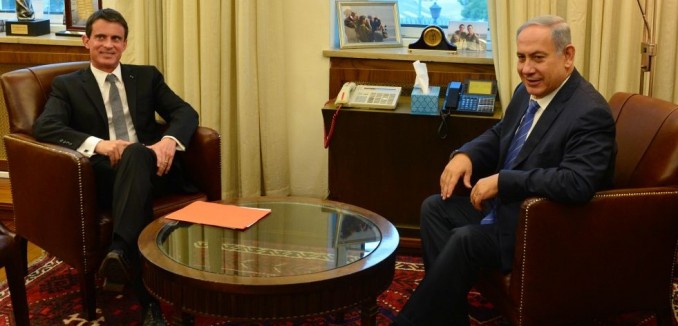Israeli Prime Minister Benjamin Netanyahu told French Prime Minister Manuel Valls during a meeting on Monday that while he appreciates France’s desire to pursue peace between Israel and the Palestinians, the international peace initiative Paris is planning will not lead to a negotiated solution, which can only be reached by bilateral talks. Netanyahu instead called for “direct negotiations without preconditions” between him and Palestinian Authority President Mahmoud Abbas in Paris, where “[every] difficult issue will be on the table: mutual recognition, incitement, borders, refugees and yes, settlements – everything.”
The current French initiative is scheduled to begin with a conference for foreign ministers from twenty nations on June 3, which will not include representatives from Israel or the Palestinian Authority. “Peace just does not get achieved through international conferences, UN-style,” Netanyahu said of the plan during his meeting with Valls. “It doesn’t get to fruition through international diktats or committees from countries around the world who are sitting and seeking to decide our fate and our security when they have no direct stake in it.”
In contrast, the Israeli premier noted that direct negotiations were “how we [achieved] peace with Jordan and before that this is how we [achieved] peace with Egypt. And both peace treaties, achieved through direct negotiations, have stood the test of time.”
It was up the Palestinians, Netanyahu said, to make the choice to “recognize the Jewish state or continue educating your people that one day Israel will be gone. It will create a Palestinian state not to live side-by-side next to Israel, but to eliminate Israel.” The talk of an international conference discouraged the Palestinians from seeking necessary compromises, Netanyahu asserted, observing that “Palestinian Prime Minister, Hamdallah, let slip the other day his hope for an imposed timetable, rather than a negotiated peace.”
Before extending his offer for direct negotiations, Netanyahu thanked Valls for his consistent condemnation of anti-Semitism. He also expressed appreciation to Valls for acknowledging that a recent French vote in UNESCO that ignored the Jewish people’s longstanding ties to the Temple Mount was a mistake.
A video of Netanyahu’s remarks is embedded below.
While Netanyahu made a similar offer for direct negotiations to Abbas last month, the Palestinian leader didn’t take him up on it. He repeated the offer earlier this month.
Abbas rejected a peace initiative offered by Vice President Joe Biden in March that included included a Palestinian capital in eastern Jerusalem and a freeze on West Bank construction in exchange for recognizing Israel as a Jewish state and relinquishing the Palestinian demand for a “right of return.”
In March 2014, Israel accepted Secretary of State John Kerry’s framework for continued peace negotiations and agreed to proceed on the basis of it, while Abbas rejected the framework and formed a unity government with the Iran-backed terrorist organization Hamas the following month. In September 2015, Netanyahu stated that he was willing to restart talks at anytime without preconditions. The chief Palestinian negotiator, Saeb Erekat, responded by calling Netanyahu’s bid a “PR stunt” and rejected the offer.
Shany Mor demonstrated in The Mendacious Maps of Palestinian “Loss,” which was published in the January 2015 issue of The Tower Magazine, that all of the territorial gains achieved by Palestinians have come from Israel, mostly as a product of direct negotiations:
As seen above, 1946 has exactly zero land under Palestinian Arab control—not autonomous, not sovereign, not anything—as it was all under British authority. We could go further back in time, to the Ottoman era, for example, and the map wouldn’t change in the slightest. 1947 sees no changes to the map, as Palestine was still under British control. Before the war in June 1967, control is divided between three states, and none of them is Palestinian. The 2005 map would be exactly as it is presented in the original series, showing the very first lands ever be ruled by Palestinian Arabsqua Palestinian Arabs. To clarify this a bit more, I have added a map from 1995, showing the withdrawals undertaken during the first two years of the Oslo process, just up to but not including the 1997 Hebron Protocol.
In fact, if we zoomed in a bit more, we would see how the peace process of the 1990s resulted in the first time a Palestinian Arab regime ruled over any piece of land. This occurred in 1994 with the establishment of the Palestinian Authority in Gaza and Jericho. That control steadily expanded over more and more land during the years leading up to the failed final status talks. Much of it was then lost during the second intifada, but eventually regained as violence died down, and the Gaza disengagement even expanded it slightly. All of these Palestinian land gains have taken place in the last 20 years and every square meter of it came not from Turkey or Britain or Jordan or Egypt, but from Israel alone; and nearly all of it through peace negotiations.
[Photo: Kobi Gideon / GPO ]




